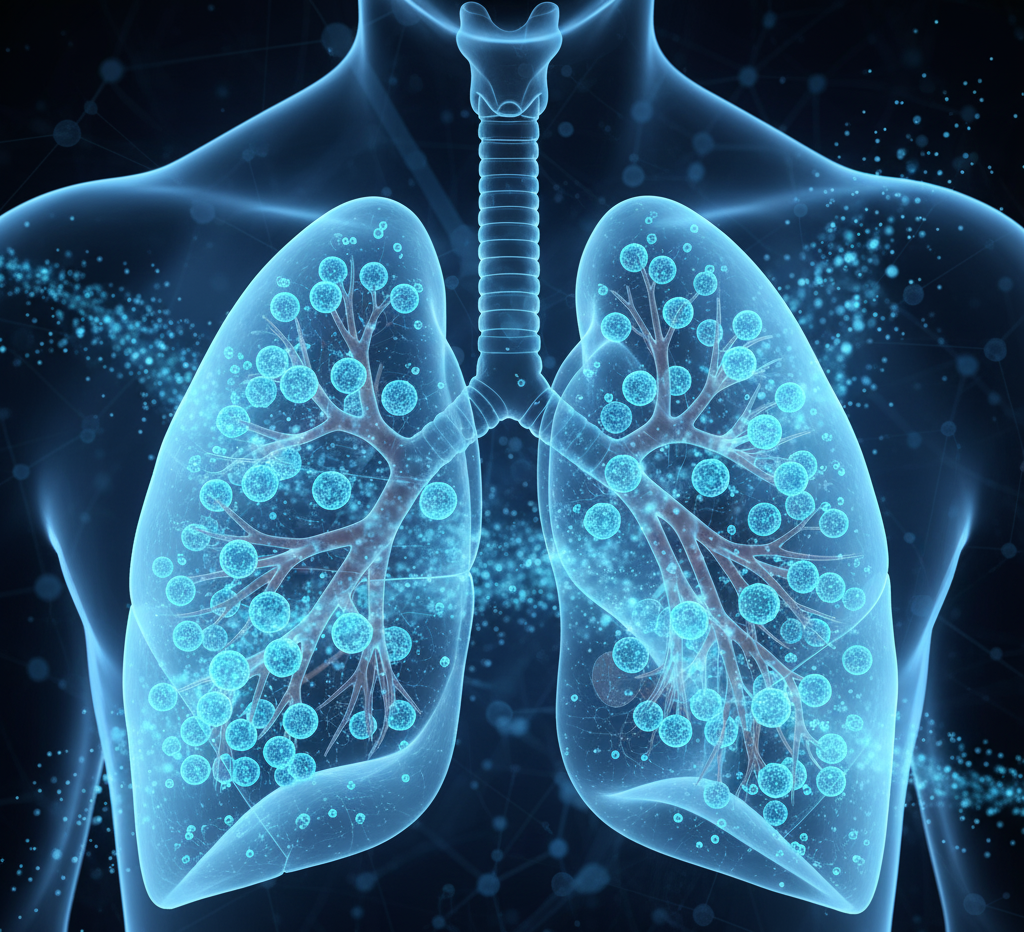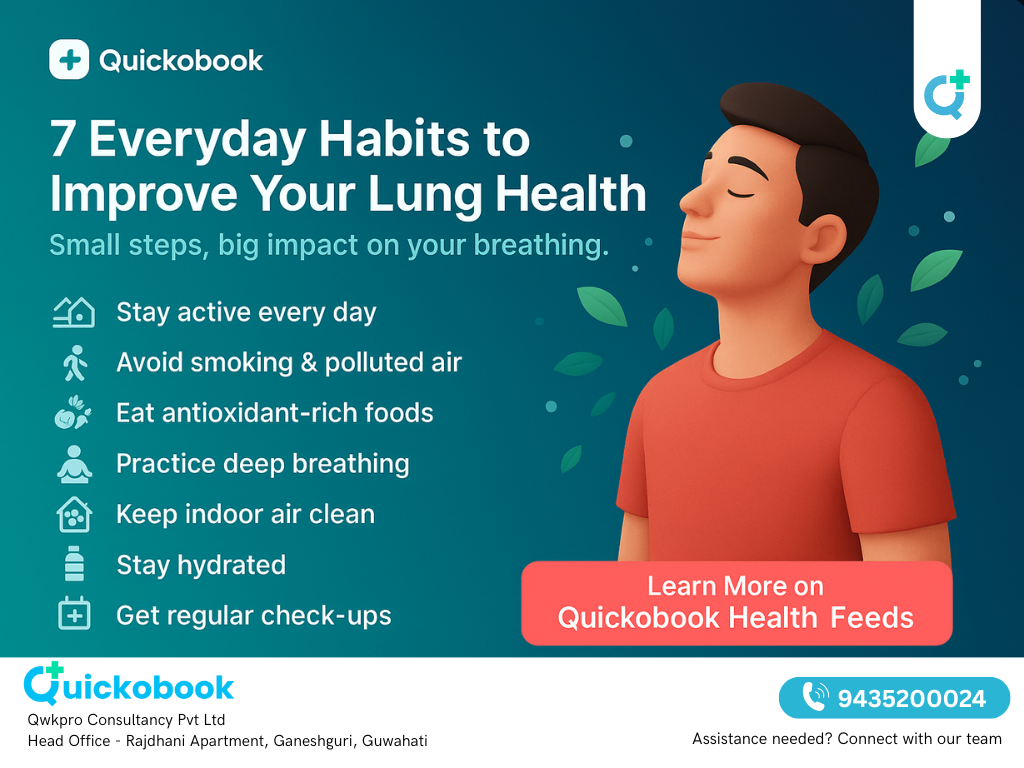Introduction: Why Lung Health Matters
Every breath you take fuels every cell in your body. Yet, many people overlook the importance of lung health until breathing becomes difficult. From urban air pollution to sedentary lifestyles, modern habits silently damage the lungs over time.
Your lungs work nonstop — about 20,000 breaths a day — to provide oxygen and remove carbon dioxide. Protecting them with daily care can prevent diseases like asthma, COPD, and even lung cancer. The good news? You can make small, powerful changes starting today to maintain healthy lungs for life.

Understanding Lung Health
The lungs are part of the respiratory system, which includes the airways, blood vessels, and muscles that help you breathe. When you inhale, oxygen enters tiny air sacs (alveoli) where it’s absorbed into the bloodstream. Strong, clean lungs ensure efficient oxygen exchange and better stamina, focus, and immunity.
However, poor air quality, smoking, infections, and inactivity can reduce lung capacity over time. Strengthening your lungs means protecting them from harm and enhancing their natural cleaning and repair mechanisms.

1. Practice Deep Breathing Exercises Daily
Deep breathing helps your lungs expand fully and strengthens your diaphragm — the main breathing muscle. Practicing breathing exercises for just 10–15 minutes daily can increase lung capacity and oxygen flow.
How to start:
- Try diaphragmatic breathing: Inhale deeply through your nose for 4 seconds, expand your belly, then exhale slowly through your mouth for 6 seconds.
- Practice pursed-lip breathing if you feel short of breath.
- Include yoga pranayama techniques like Anulom Vilom and Bhramari for better control.
Tip: Start and end your day with mindful breathing. It reduces stress and keeps your airways open.
2. Quit Smoking for Good
Smoking is the leading cause of chronic lung diseases like COPD, lung cancer, and emphysema. Cigarette smoke contains over 7,000 harmful chemicals that destroy lung tissue and narrow airways.
Steps to quit smoking:
- Seek medical help or counseling for nicotine replacement therapy.
- Avoid triggers like alcohol or social smoking zones.
- Join online support communities or Quickobook wellness programs.
- Reward yourself for every milestone — even a smoke-free week counts!
Remember: It’s never too late to quit. Within days of quitting, lung function begins to improve and oxygen levels rise.

3. Avoid Air Pollution and Maintain Clean Air Indoors
Urban air pollution, dust, and industrial fumes are silent enemies of healthy lungs. Prolonged exposure can irritate airways, trigger asthma, and reduce overall lung function.
How to protect yourself:
- Check Air Quality Index (AQI) before outdoor activities.
- Use N95 masks in polluted areas or during traffic hours.
- Keep indoor plants like peace lilies and snake plants — natural air purifiers.
- Avoid burning incense or synthetic air fresheners indoors.
Pro tip: Keep windows open early morning when pollution is low, and clean AC filters every 15 days.
4. Stay Physically Active
Regular physical activity improves lung endurance and oxygen use. When you exercise, your heart and lungs work harder to deliver oxygen — keeping your respiratory muscles strong.
Best exercises for lung health:
- Brisk walking, swimming, cycling, or yoga (30 minutes/day).
- Aerobic workouts and stretching for flexibility.
- Singing or playing a wind instrument — yes, they strengthen lungs too!
Even moderate exercise helps remove mucus buildup and improve breathing rhythm.
5. Eat Foods That Support Lung Function
A healthy diet supports lung repair and fights inflammation. Nutrients like antioxidants, omega-3 fatty acids, and vitamin C protect the lungs from pollution and oxidative stress.
Lung-friendly foods:
- Citrus fruits (Vitamin C for immunity)
- Leafy greens (rich in iron and chlorophyll)
- Turmeric (natural anti-inflammatory)
- Ginger and garlic (reduce congestion)
- Nuts and seeds (contain omega-3s)
Avoid processed foods and sugary drinks that promote inflammation.
6. Stay Hydrated to Clear Mucus
Drinking enough water keeps the mucosal lining in your lungs thin — making it easier to expel pollutants and bacteria. Aim for 2–3 litres of water daily, and include herbal teas like tulsi or ginger for natural cleansing.

7. Schedule Regular Health Check-ups
Many lung diseases progress silently. Regular lung health check-ups can detect issues early. If you live in polluted cities or have a smoking history, get periodic:
- Spirometry tests (measure lung capacity)
- Chest X-rays
- Oxygen level monitoring (SpO₂)
Quickobook lets you book consultations with pulmonologists or general physicians online across India for preventive lung care.
When to See a Doctor
Seek immediate medical help if you experience:
- Persistent cough for more than 3 weeks
- Shortness of breath during mild activity
- Wheezing or chest tightness
- Coughing up blood or mucus
Timely care can prevent chronic respiratory conditions and improve recovery.
Common Risks and Complications of Poor Lung Health
Ignoring lung symptoms can lead to:
- Asthma
- COPD (Chronic Obstructive Pulmonary Disease)
- Lung infections or pneumonia
- Reduced exercise capacity
- Increased risk of heart disease
Conclusion
Your lungs are life’s rhythm — every breath connects body and mind. By following these 7 everyday habits, you strengthen your respiratory system, boost immunity, and enjoy longer, more energetic days.
Even small steps — quitting smoking, walking daily, and mindful breathing — can make a world of difference. Protect your lungs today for a healthier tomorrow.
READ ALSO : The Hidden Evolution Making Men's Sperm More Dangerous With Age
Quickobook CTA
Need to check your lung health or consult a doctor online?
Book your appointment on Quickobook — India’s trusted digital healthcare platform.
- Find certified pulmonologists and general physicians near you
- Get same-day consultations
- Access affordable diagnostic tests and preventive care plans
Your breath deserves care — Quickobook makes it simple.
FAQs on Lung Health and Breathing
Q1. What are the best exercises for lung health?
A. Deep breathing, yoga, brisk walking, and swimming are great for building lung strength.
Q2. How can I improve my lung capacity naturally?
A. Practice breathing exercises, stay active, and avoid air pollution.
Q3. Can lungs repair themselves after quitting smoking?
A. Yes, within weeks of quitting, your lungs begin healing and cleaning out toxins.
Q4. Does walking help lung health?
A. Absolutely. Walking boosts oxygen flow and improves endurance.
Q5. Can air purifiers improve lung function?
A. Yes, especially for those with allergies or asthma; they reduce indoor pollutants.
Q6. What foods are good for the lungs?
A. Citrus fruits, leafy greens, turmeric, and ginger support lung function.
Q7. How much water should I drink for healthy lungs?
A. 2–3 litres daily helps clear mucus and keeps airways moist.
Q8. Does yoga help with lung problems?
A. Yes, pranayama and asanas like Bhujangasana improve breathing control.
Q9. Is shortness of breath normal with age?
A. Mild decline is normal, but persistent breathlessness needs evaluation.
Q10. Can lung damage be reversed?
A. Mild damage can heal with healthy habits; chronic conditions require medical care.
Q11. Does air pollution affect non-smokers?
A. Yes, pollution can damage anyone’s lungs and increase disease risk.
Q12. What are signs of poor lung health?
A. Cough, wheezing, fatigue, or chest tightness.
Q13. How does sleep affect breathing?
A. Poor sleep worsens oxygen balance; maintain a regular sleep schedule.
Q14. Can stress affect lung health?
A. Yes, stress alters breathing patterns and weakens respiratory muscles.
Q15. Are steam inhalations good for lungs?
A. Yes, they relieve congestion but should not replace medical care.
Q16. Does cold air damage lungs?
A. It can trigger bronchospasms; cover your mouth with a scarf in winter.
Q17. Can running increase lung power?
A. Yes, endurance exercises expand lung capacity.
Q18. Is holding breath a good lung exercise?
A. Practiced safely, it strengthens respiratory control.
Q19. Can second-hand smoke harm lungs?
A. Definitely; it increases asthma and infection risks.
Q20. What vitamins are essential for lung health?
A. Vitamins C, D, and E protect against oxidative damage.
Q21. How can I test my lung function at home?
A. You can use a peak flow meter or oximeter for basic monitoring.
Q22. Can poor posture affect breathing?
A. Yes, slouching restricts lung expansion — sit upright often.
Q23. What’s the best time for breathing exercises?
A. Early morning, when air quality is better.
Q24. Can allergies damage the lungs?
A. Repeated allergic reactions can inflame airways.
Q25. What’s the link between lungs and heart health?
A. Weak lungs strain the heart due to lower oxygen delivery.
Q26. Can indoor pollution be worse than outdoor?
A. Yes, from dust, smoke, and chemicals — ventilate rooms well.
Q27. Is chest pain always a lung problem?
A. Not always — consult a doctor to rule out heart or muscle issues.
Q28. Can home workouts improve lung health?
A. Yes, aerobic exercises and yoga at home are beneficial.
Q29. Does asthma run in families?
A. Genetics play a role, but lifestyle factors matter too.
Q30. Can lung infections be prevented?
A. Good hygiene, vaccines, and avoiding pollution help.
Q31. What is COPD?
A. A group of diseases (like chronic bronchitis and emphysema) that block airflow.
Q32. Can lung diseases be cured?
A. Some are manageable, others chronic — early diagnosis helps.
Q33. How does obesity affect lungs?
A. Excess weight restricts breathing and lowers oxygen intake.
Q34. Can meditation help breathing?
A. Yes, it promotes calm, rhythmic breathing patterns.
Q35. What’s a normal oxygen saturation level?
A. 95–100% is ideal for healthy adults.
Q36. Can I strengthen my lungs after COVID-19?
A. Yes, start with light breathing exercises and gradual activity.
Q37. Do children need lung exercises?
A. Yes, fun activities like blowing balloons help strengthen their lungs.
Q38. Can lung issues cause fatigue?
A. Yes, low oxygen leads to tiredness and brain fog.
Q39. What are natural remedies for congestion?
A. Steam inhalation, ginger tea, and saline sprays can help.
Q40. Can dairy worsen breathing issues?
A. For some, dairy increases mucus; observe your body’s response.
Q41. How can I detox my lungs?
A. Quit smoking, drink water, and include antioxidant-rich foods.
Q42. Can poor air conditioning harm lungs?
A. Unclean filters may harbor allergens — clean them regularly.
Q43. Is cough syrup good for lung infections?
A. Only as prescribed; misuse may mask symptoms.
Q44. Does laughing improve lung health?
A. Yes! Laughter expands lungs and clears stale air.
Q45. Can lung health affect immunity?
A. Yes, lungs are key in filtering pathogens.
Q46. Are there vaccines for lung protection?
A. Flu and pneumonia vaccines reduce lung infection risk.
Q47. Can pets affect breathing?
A. Pet dander can irritate sensitive lungs; maintain hygiene.
Q48. How often should I do lung checkups?
A. Once a year for adults; every 6 months for smokers or asthmatics.
Q49. Can perfumes or sprays trigger lung issues?
A. Yes, artificial fragrances can irritate airways in sensitive people.
Q50. How can I keep my lungs healthy every day?
A. Avoid smoking, exercise regularly, eat antioxidant foods, and practice deep breathing.










Comments (0)
No comments yet. Be the first to share your thoughts!
Leave a Comment